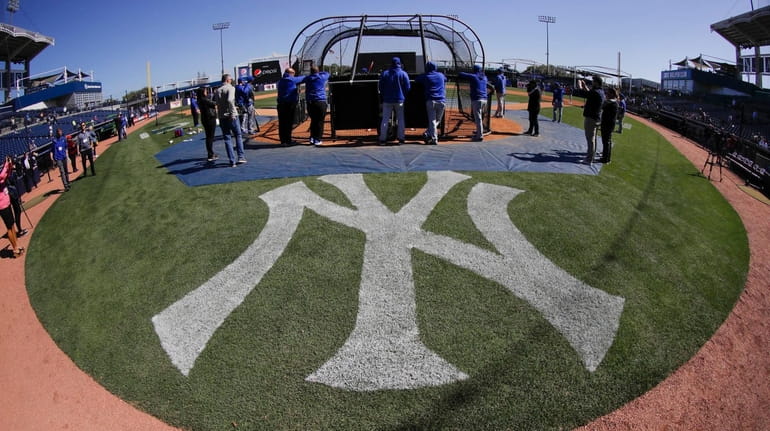Even the mighty Yankees forced to deal with sobering reality of the coronavirus

The Blue Jays take batting practice before a game against the Yankees on Feb. 22 in Tampa. Credit: AP/Frank Franklin II
FORT MYERS, Fla.
It was bound to happen. And for the Yankees to have the first known case of COVID-19 in baseball, after an unidentified minor-leaguer tested positive, was an especially cruel twist of fate.
We say that because a day after spring training was officially suspended, the Yankees unanimously voted to remain together at their Tampa complex, becoming the first team to do so. The unified front was taken as a ray of light amid the coronavirus gloom, an effort to maintain a sense of baseball normalcy with the rest of the world in upheaval.
But now everyone knows that was an illusion. An admirable effort, definitely. And we applauded the Yankees for it in this space. Still, their collective stand against an invisible foe was a mirage all the same. To think the Yankees, or any team for that matter, could insulate themselves from being affected by a global pandemic — one that may be on the brink of exploding in the United States — was foolhardy.
For now, it’s just one minor-leaguer, and general manager Brian Cashman said Sunday during a conference call that this was the only coronavirus test administered to a member of the Yankees’ organization. But is there any doubt that more will follow?
With everything shutting down around them, from schools to stores to international flights, Major League Baseball can’t consider itself immune from the virus’ reach. And with that acknowledgment comes a sobering reality — that it’s pointless to even guess at a potential start date to the season.
On Thursday, MLB floated the idea of at least a two-week delay for Opening Day, a timeline that would push it to April 9. That date now seems ludicrous, especially in light of the CDC’s recommendation Sunday that all in-person events involving 50 or more people be called off for the next eight weeks.
So where do we even go from there? Memorial Day? July 4? Should we begin to consider the unthinkable — that the regular season could be wiped out as we wait for the COVID-19 menace to be contained?
Truth is, everything is on the table, and MLB is painfully aware of that. The point was driven home by the Yankees’ positive test, and according to the medical experts, we’re only at the tip of the iceberg.
Just this past week, every pro sports league, as well as the NCAA, canceled or postponed all events or activities in the span of 48 hours. Meanwhile, MLB had to pump the brakes in the middle of Thursday’s spring training schedule before halting the games altogether.
Baseball’s situation, however, was somewhat unique. This was spring training, six weeks of practice, and the initial feeling seemed to be that teams could remain in a sort of safer middle ground — keep working out, even if games couldn’t be played. The facilities in Florida and Arizona could serve as bunkers, the clubhouses could be a semi-quarantined zone, the players could maintain a fairly regular baseball existence.
It was an enticing scenario, because MLB didn’t want to just throw away more than a month’s worth of preparation. Neither did the players, who already had invested the work to get ready for the season.
So while everyone had the option to leave and return home, there was a temptation to be on standby, in the hope that baseball could weather the storm during a relatively short hiatus.
Then a Yankees minor-leaguer called in Friday with “fever and fatigue,” according to Cashman, and later came up positive for coronavirus.
Because their minor-leaguers work out at a separate complex across from the street from Steinbrenner Field, the Yankees believe their major-league roster was unaffected, and only the lower levels were put under quarantine.
The message was clear, however. Now the Yankees, like school boards and corporate leaders, were dealing with the local health authorities, and baseball no longer was a consideration. Cashman was put in the same position as so many others recently — trying to do his part to help contain the spread of COVID-19.
“I think even the scientists, the smartest people that we all should be listening to, are still trying to evaluate and understand and come up with what should be done next,” Cashman said. “We’re just reacting to that, like everybody else is, and trying to find the best practices and trying to do the right thing at all times.”
Increasingly, with each passing day, the right thing seems to be a total shutdown, or as close to one as possible. MLB appears to be moving in that direction, too, based on the memo sent to all 30 teams Sunday that pushed for “social distancing” and essentially outlawed any group practices.
Soon, however, the half-measures probably will have to be abandoned. MLB has scheduled yet another leaguewide conference call for Monday and the health protocols will be discussed again. Expect more changes.
That’s the only thing we know for sure. In this new coronavirus-warped landscape, the ground keeps moving beneath us.

